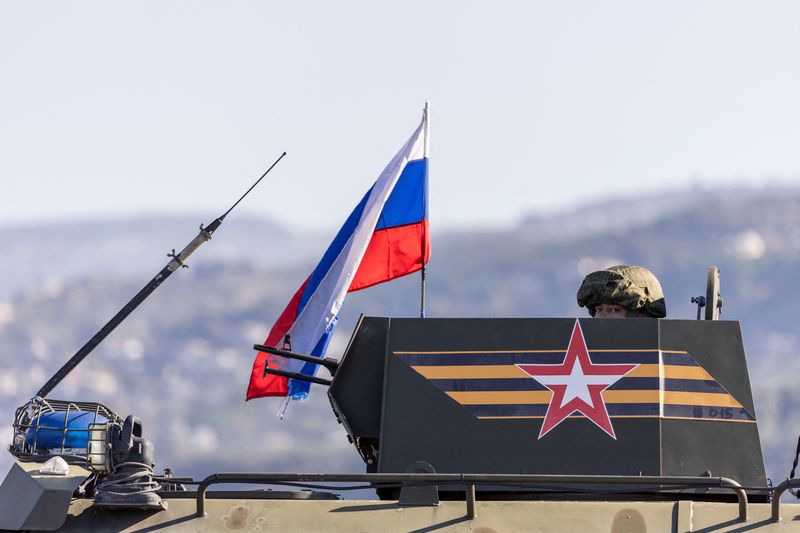Physical Address
304 North Cardinal St.
Dorchester Center, MA 02124
Physical Address
304 North Cardinal St.
Dorchester Center, MA 02124

By Tuvan Gumrukcu, Suleiman Al-Khalidi and Guy Faulconbridge
TARTOUS, Syria (Reuters) – Russia is withdrawing its troops from the front lines in northern Syria and from positions in the Alawite mountains, but is not abandoning its two main bases in the country after the fall of President Bashar al-Assad, four Syrian officials told Reuters.
The ouster of Assad, who along with his late father, former president Hafez al-Assad, forged a close alliance with Moscow, has called into question the future of Russian bases – the Hmeimim air base in Latakia and the Tartus naval facility.
Satellite images from Friday showed what appeared to be at least two Antonov AN-124s, among the world’s largest cargo planes, at the Hmeimim base with their nose cones open, apparently preparing to load.
At least one cargo plane left for Libya on Saturday, a Syrian security official stationed outside the facility said.
Syrian military and security sources in contact with the Russians told Reuters that Moscow was withdrawing its forces from the front lines and withdrawing some heavy equipment and senior Syrian officers.
But the sources, who spoke on condition of anonymity because of the sensitivity of the situation, said Russia is not withdrawing from its two main bases and has no current intention to do so.
Some of the equipment is being sent back to Moscow, as are very senior officers from Assad’s army, but the aim at this stage is to regroup and redeploy as the situation on the ground dictates, a senior Syrian army officer in contact with the Russian military told Reuters.
A senior rebel official close to the new interim administration told Reuters that the issue of Russia’s military presence in Syria and past agreements between the Assad government and Moscow are not being discussed.
“That is a matter for future talks and the Syrian people will have the last word,” the official said, adding that Moscow had established channels of communication.
“Our forces are now in the immediate vicinity of the Russian bases in Latakia,” he added without elaborating.
The Kremlin has announced that Russia is holding talks with Syria’s new rulers about the bases. The Russian Defense Ministry did not respond to a request for comment on the Reuters report.
A Russian source who wished to remain anonymous said that talks with the new rulers of Syria are ongoing and that Russia is not withdrawing from its bases.
Reuters could not immediately determine how Syrian rebel leader Ahmad al-Sharaa – better known as Abu Mohammed al-Golani – sees the long-term future of the Russian bases.
Russian President Vladimir Putin, whose intervention in Syria’s civil war in 2015 helped Assad when the West was calling for his ouster, granted Assad asylum in Russia after Moscow helped him escape on Sunday.
BASE
Moscow has supported Syria since the beginning of the Cold War, and recognized its independence in 1944 as Damascus sought to overthrow French colonial rule. The West has long considered Syria a Soviet satellite.
Bases in Syria are an integral part of Russia’s global military presence: the Tartous naval base is Russia’s only repair and supply hub in the Mediterranean, and Hmeimim is the main staging post for military and mercenary activities in Africa.
Russia also has listening points in Syria that are run next to Syrian signal stations, according to Syrian military and Western intelligence sources.
The Tartus facility dates back to 1971, and after Russia intervened in the civil war to help Assad, Moscow was given a free 49-year lease in 2017.
Yoruk Isik, an Istanbul-based geopolitical analyst who runs the Bosphorus Observer, said Russia is likely sending cargo planes from Syria across the Caucasus and then to the Al Qadim airbase in Libya.
On the highway connecting the Hmeimim airbase to the base in Tartus, a Russian convoy of infantry fighting vehicles and logistics vehicles could be seen moving towards the airbase, a Reuters reporter said.
The convoy stopped due to a breakdown in one of its vehicles, and soldiers stood by the vehicle and worked to fix the problem.
“Whether it’s Russian, Iranian or the previous government that oppressed us and denied our rights… we don’t want any intervention from Russia, Iran or any other foreign intervention,” said Ali Hallum, who is from Latakia and lives in Jabla. he told Reuters.

In Hmeimim, Reuters saw Russian soldiers walking normally around the base and planes in hangars.
Satellite images taken by Planet Labs on Dec. 9 show at least three ships in Russia’s Mediterranean fleet — two guided-missile frigates and an oil tanker — anchored about 13 km (8 miles) northwest of Tartus.